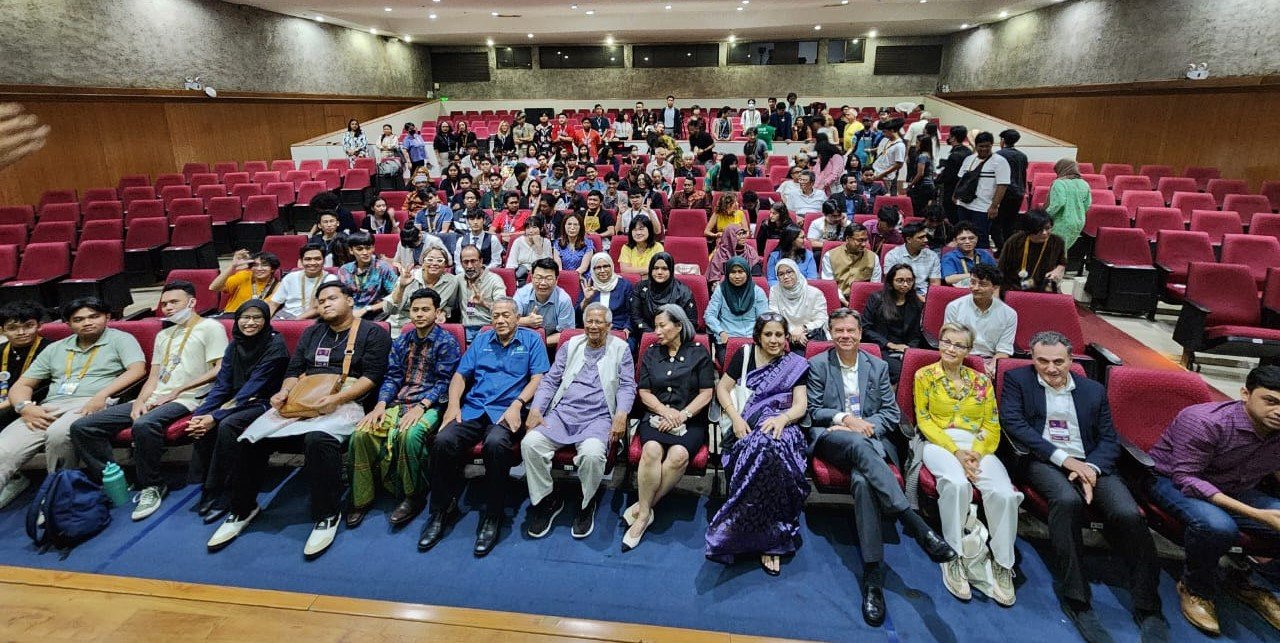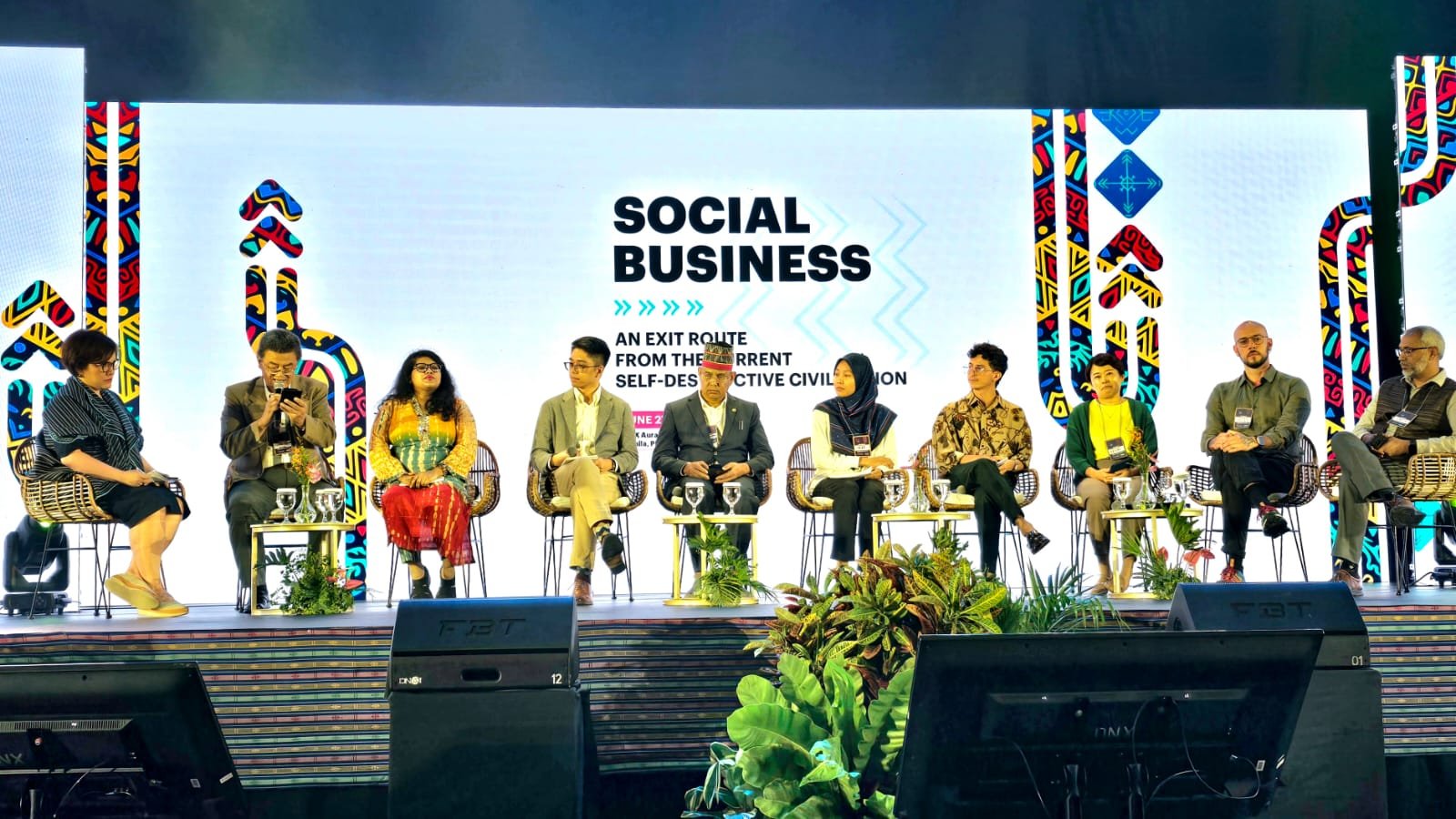Some Issues Relating To Social Business
Some Issues Relating To SOCIAL BUSINESSES
Muhammad Yunus
TYPES OF SOCIAL BUSINESSES
01. TYPE 01 OR CLASSIC SOCIAL BUSINESS
A social cause-driven non-dividend company, or any other type of enterprises (such as, co-operative, individually or jointly owned business, or any other legal form of business ) devoted to solving social problems and does not distribute profit to shareholders except for recouping investment amount, will be recognized as a Type 1 social business.
02. TYPE 02 SOCIAL BUSINESS
A profit-distributing corporate body primarily (at least 75% of equity) owned by the poor will be categorized as a special kind of social business. We may call it Social business Type 2.
Other social businesses of Type 2 category are the business enterprises owned (at least 75% of equity) by a social business or by a foundation, or by a Trust, or an NGO, or by any not-for-profit enterprise where owner organization (NGO, or foundation, or Trust, or other such entities) takes out profit from their businesses only for the exclusive purpose of creating and operating Social Business Fund/s within the parent organization. Social Business Fund itself is operated as a social business and follow the seven principles of social business.
03. PRE SOCIAL BUSINESS
Can an NGO or a not-for-profit entity be called a social business if it itself operates as a social cause-driven business ?
Strictly speaking, no.
In order to be a social business, the entity has to be a ‘business’ under any legal form of business, owned by one or more individuals, or under co- operative or corporate ownership. It should be registered as a business and follow business laws and regulations. NGO or a not-for-profit entity does not satisfy these conditions.
But in this case, we cannot overlook the fact that this NGO in question is a social business-like entity in action and spirit. Only thing missing is its ownership criterion. We may call this NGO a ‘Pre-Social Business’. It may become a Type 1 or Type 2 social business by changing its legal status by registering itself as a business.
It can become Type 1 social business if the NGO itself transforms into a business entity, moving away from its NGO legal status.
It can become a Type 2 social business if the NGO separates out the commercial part and creates a business entity around it, under its ownership. At least 75% of the ownership should be retained by the NGO to qualify it as a Type 2 social business. However, the NGO must follow the rules of Type 2 social business by creating one or more social business funds with all the profits coming from the business.
What Role Governments Can Play In Promoting Social Business
Can Create an Unambiguous Legal Identity Most important thing for governments to do is to define social business in its laws and regulations to give it a clear identity. Unless a government adopts a clear unambiguous definition before it starts promoting and operating social business it will be totally counter- productive. It will close the door for social business for ever. It should be defined in the following way:
“Social business is a social cause-driven enterprise aiming at solving any type of social and economic problem, such as, poverty, unemployment, healthcare, education, nutrition, housing, financial services, entrepreneurship for the poor, environment, homelessness, old age, technology, green energy, etc, and it does not distribute any profit to its shareholder/s orowner/s, except for recouping their investment amount.”
Law should require social business companies, and enterprises to incorporate the social objectives in its Memorandum of Association and Articles in an appropriate manner following the legal definition. A social business company should also include the following in its Memorandum of Association and Articles.
“The company owners will not receive any personal profit beyond recouping their respective investments. After that all profits will be ploughed back into the enterprise. The enterprise will use the money for expansion of the business and/or invest in new social businesses, and/or create social business fund/s.”
Also government will make it mandatory to include seven principles of social business in the Memorandum of Association and Articles as company’s core operational principles.
Government May Become a Facilitator and a Promoter of Social Business
Government can give priorities to Social Business in its regular activities; give priority to social businesses in selecting applicant enterprises for licenses, rights, and privileges, and for any type of business contracts for construction, purchase or supplies, etc.
When giving any type of commercial licenses government can offer licenses
a) Exclusively to social businesses. b) Give preferences to,
i. Social businesses. ii. An applicant who owns a social business wholly or partially.
Why Give Priority
Government is responsible for enhancing the wellbeing of the people. By prioritizing social business as a matter of policy, people benefit in many ways, most important benefit being the fact that the profit accruing to social business does not contribute to wealth concentration.
In addition, since social businesses are dedicated to solving social problems it helps achieve the goals of government directly.
Social businesses are sustainable, create a self expanding system. Out of profit of the social business, business itself can be expanded or more social businesses may be created.
Beside Giving Priorities What Else Government Can Do?
- Another important thing that a government can do is to create directly or indirectly Social Business Funds, Social Business Venture Capital Funds, Social Business Insurance Companies, etc, to facilitate in setting up of social businesses, and promoting entrepreneurship among the unemployed youth.
- Government can create these funds and operate as government entities or inspire and encourage private and charity sectors to create similar entities. These funds must be designed as social business themselves.
- Government can encourage creation of these funds at all levels of government, such as, city, province, and federal. Government can develop dedicated management teams to manage these funds.
- Government can create these funds specially for backward regions and encourage the businesses which operate in those areas to create social businesses taking advantage of these funds to benefit the local economy and the local people.
- Government can encourage creation of Social Business cities, villages, and provinces to solve social problems within the boundaries of these administrative /political units.
- Government can encourage setting up of specialized audit firms to audit social businesses every year to report to the regulators whether they are actually are following the principles of social business. Audit firms can be encouraged to assess the effectiveness of the social businesses and offer suggestions to improve efficiency.
- Government can introduce social business courses at levels of educational system.
- Government can have an annual social business design competition for different groups of people—youth, women, elderly people, retired people, corporate business executives, and award these prizes through national events and celebrations.
- Government leaders can become cheer-leaders for social businesses by drawing attention to existing social businesses and government’s readiness to support social businesses.
What May Be The Expansion Strategy of Social Business ?
01. Replication is the best strategy to expand the out-reach of any social business. The most challenging part of a social business is to develop the first sustainable prototype. Start with one or two units of social businesses as experimentation. Once these experimental units show signs of success, they can be replicated in a slow motion – first try with 3 units, then go to 10 units, then speed up the process.
Moving step by step is an important learning process. At each step we learn from our experiences, and introduce important improvement in the model. When we see the model has approached a stage of near-perfection, the speed of replication can get faster, and spread around in various geographical areas.
02. Replication can be undertaken in the following ways:
a. May create provincial, or national or international companies to replicate,
b. May create franchising company.
c. May create partnership companies with local entrepreneurs, and venture capital funds.
d. May create partnership companies with international companies and NGOs, Foundations, etc.
e. May enter into contracts with governments at various levels —local, regional, and national, companies, foundations or other service providers.
f. Government can inspire all corporates, domestic and multinational, to create a social business along side their existing businesses. Government can give special facilities to those corporates which do so.
g. Government may inspire all banks and financial institutions to create as social business subsidiaries to bring financial services to unbanked people, particularly women, and social business funds.
h.Government can encourage all NGOs to transform part of their activities as social business.
Related
15th Social Business Day 2025 to be held on June 27–28
Statement from Professor Muhammad Yunus:
দেশবাসীর উদ্দেশ্যে প্রফেসর ইউনূসের বক্তব্য
Prof. Muhammad Yunus felicitated in Manila on the occasion of his 40th anniversary of receiving the “Ramon Magsaysay” Award.

“র্যামন ম্যাগসাইসাই” পুরস্কার প্রাপ্তির ৪০তম বার্ষিকী উপলক্ষে প্রফেসর মুহাম্মদ ইউনূসকে ম্যানিলায় সম্মাননা প্রদান

Social Business Academia Dialogue & 3ZERO Club Convention 2024 held in Manila, Philippines

The 14th Social Business Day concludes in Manila, Philippines

The 14th Social Business Day 2024 kicks off in Manila, Philippines



